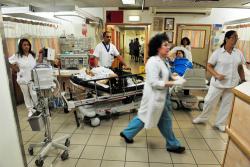 I entitled this post Collaborative Learning: Ebola because I empathize with the Presbyterian Hospital ED physician who sent the patient home initially. Unfortunately, this is how we learn to take a better history, do a more complete physical exam, and improve our diagnostic accuracy, by making mistakes, owning up to our shortcomings, and resolving to do better the next time.
I entitled this post Collaborative Learning: Ebola because I empathize with the Presbyterian Hospital ED physician who sent the patient home initially. Unfortunately, this is how we learn to take a better history, do a more complete physical exam, and improve our diagnostic accuracy, by making mistakes, owning up to our shortcomings, and resolving to do better the next time.
 I entitled this post Collaborative Learning: Ebola because I empathize with the Presbyterian Hospital ED physician who sent the patient home initially. Unfortunately, this is how we learn to take a better history, do a more complete physical exam, and improve our diagnostic accuracy, by making mistakes, owning up to our shortcomings, and resolving to do better the next time.
I entitled this post Collaborative Learning: Ebola because I empathize with the Presbyterian Hospital ED physician who sent the patient home initially. Unfortunately, this is how we learn to take a better history, do a more complete physical exam, and improve our diagnostic accuracy, by making mistakes, owning up to our shortcomings, and resolving to do better the next time.
We all wish that we could get everything we need from guidelines, but the best guidelines are dynamic documents that improve in real time as we gather experience. As Carl Taylor wrote in Disaster Preparedness for Healthcare Professionals:
Disasters are the product of choices that are politically, environmentally, socially, and economically driven. Disasters occur when a natural or man-made event comes into contact with these choices. Thus,we can reduce or avoid the impact of a disaster through our planning, choices, decisions and actions.
Collaborative Learning: Hazard Vulnerability Analysis
One such opportunity comes during the creation of a hazard vulnerability analysis (HVA). HVA is a tool, which allows us to consider our risk exposure and modify our planning and risk management before events occur.
We must overcome the 4 M’s of flawed HVAs:
- Motive: facilities often create HVAs to check off boxes, not to reduce exposure proactively
- Myth: Myths lower estimated risk because an event has not happened before or for many years. Montana was relatively free of tornadoes until 2010, when in the first seven months, over a dozen tornadoes swept the state. Wind, combined with heavy rains pushed a 5-foot wall of water in the direction of Billings Clinic Hospital. The myth that snow was the only natural disaster in Montana is now put to rest.
- Magnitude: Even if an event is possible, its magnitude is downplayed because of insurance costs, remediation costs, or simply an honest belief that “nothing bad ever happens here”. The earthquake in Haiti was followed by volcanic eruptions in Iceland, and exceeded by the flooding of the Indus river, leaving 15 to 20 million Pakistani people homeless.
- Management: Although optimism and faith are important, organizations should use the HVA to question planning assumptions. We need more than engineers and security police to participate in disaster planning, i.e. physicians, nurses, and healthcare administrators all have a vital role. Lives are at stake.
Finally, a plea to the news media and Congress: we need to celebrate learning. Learning is a vital part of disaster planning and thus never failure.
As always, I welcome your input to improve healthcare collaboration where you work. Please send me your comments and suggestions for improvement.
Kenneth H. Cohn
© 2013, all rights reserved
Disclosure:
I have not received any compensation for writing this content. I have no material connection to the brands, topics and/or products that are mentioned herein.
© Healthcare Collaboration. All Rights Reserved.






